 MPC Minutes ... The minutes of the MPC meeting in July were released this week. The decision to keep rates at current levels was unanimous. However, “for a number of members, the balance of risks to medium term inflation was becoming more skewed to the upside.” “For those members, the decision between holding Bank Rate at its current level versus a small increase was becoming more finely balanced.” Is this significant? Yes - it now looks as if Ian McCafferty and Martin Weale have been joined by David Miles in the more hawkish camp. Recent statements from David Miles and the Governor suggest rates could be on the rise by the end of the year. Retail Sales … And why not? June retail sales confirmed the strong growth in consumer spending continues. Sales volumes increased by 4% compared to June last year. Online sales increased by 11.4% accounting for over 12% of all retail activity. Food sales increased by almost 2%. The big beneficiaries - department stores and household goods stores, with sales volumes up by 7%. Is that so good for retailers? More volume means more activity but for lower value. Overall values increased by less than 1%. Oh how the high street would love inflation … boosting margins and the cash take in the process. The pressure continues on conventional retail. Government Borrowing … No pressure on the Treasury as the cash take continues to reduce borrowing. Government borrowing fell in June to £9.4 billion compared to £10.2 billion last year. In the first three months of the fiscal year, total borrowing was just £25.1 billion compared to £31.2 billion last year. That’s a 20% reduction. Higher VAT receipts and Tax charges boosted revenues by over 5%. Current spending actually fell underpinned by cash controls and lower borrowing costs. The average debt coupon in the month was just 3.5% on total debt of £1.5 trillion. The Chancellor is on track to hit the £75 billion target for current year borrowing set by the OBR in March. The July target of just under £70 billion may be more of a challenge. Commodity Prices … Commodity prices took a hit this week as gold came under pressure and copper hit a six year low. Weak PMI manufacturing data out of China cast further doubt on the 7% growth figures. Weaker commodity and energy prices will impact on growth in Australia, Canada, Russia and Brazil if the trend continues. Oil Brent Crude closed at $54.41 casting doubt on further strong price recovery for the rest of the year. So when will rates rise? … The US looks set to move in September and we expect the UK to follow before the end of the year or early next. The minutes of the July MPC meeting confirm the direction of travel. So what happened to Sterling this week? Sterling moved down against the Dollar to $1.5511 from $1.561 and moved down against the Euro to €1.413 from €1.439. The Euro moved up against the Dollar to €1.097 from 1.085. Oil Price Brent Crude closed at $54.41 from $56.80. The average price in July last year was $106.77. The deflationary push continues. A $75 - $80 recovery by Q4 remains the base case in our outlook forecast. Markets, slumped. The Dow closed down at 17,620 from 18,050 and the FTSE closed down at 6,579 from 6,775. Gilts yields - softened. UK Ten year gilt yields fell to 1.94 from 2.08. US Treasury yields moved to 2.27 from 2.367. Gold moved down to $1,079 ($1,133). That’s all for this week. Don’t miss the Great Manchester Economics Conference in October. The Agenda is now on the web site. The Early Bird deal is now open. The FIRST one hundred tickets save over £50. Check out the web site Sign up and Save. The Saturday Economist - now mailing to 50,000 businesses every month! John © 2015 The Saturday Economist by John Ashcroft and Company : Economics, Corporate Strategy and Social Media ... Experience worth sharing. The material is based upon information which we consider to be reliable but we do not represent that it is accurate or complete and it should not be relied upon as such. We accept no liability for errors, or omissions of opinion or fact. In particular, no reliance should be placed on the comments on trends in financial markets. The receipt of this email should not be construed as the giving of investment advice.
0 Comments
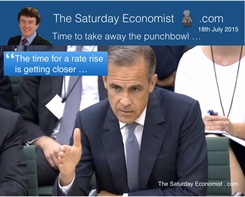 The Governor gave the clearest indication yet interest rates are likely to rise by the end of the year, in appearances in London and Lincoln, this week. On Tuesday, he was in front of the Treasury Select Committee and on Thursday he was in Lincoln, delivering his lecture “From Lincoln to Lothbury, a short study on Magna Carta and the Bank of England. “The time is getting closer of a rate rise” … “the decision as to when to start such a process of adjustment will likely come into sharper relief around the turn of this year”, the message. Magna Carta and the Bank of England … Inflation, public sector finances and bail out problems in Europe featured in the Lincoln speech. Challenges besetting King John in 1215, not King George in 2015. Wage inflation was then, heading for 20%. Money supply was surging. Government finances had taken a massive hit some years earlier. Richard I had managed to get himself trapped in Germany on his way back from the Holy Land. The king was held to ransom by the Germans demanding £66,000 in silver for the bail out. The equivalent of two to three times annual crown income was needed to secure an agreement. The strain on central government finances evident. King John narrowly avoided a VAT hike and currency devaluation. No IMF on the mediaeval landscape. No haircuts on offer despite onerous and punitive terms. Calls for a Lexit [Lionheart exit] unheeded. King John, years later, struggling for cash was obliged to sign the Magna Carta and the rest, as they say is history. Where was the MPC then when needed! bemoaned the Governor. David Miles …. It was clearly a week for signals. David Miles, one of the doves on the MPC reiterated the bank rise message … “We are now close to the time when it is appropriate to raise rates.” he said in a speech given at Resolution Foundation, in London. The dove is shedding his love for life on Planet ZIRP. David Miles will retire from the MPC in August. Six years and no decision on an interest rates rise, remarkable. Inflation … The latest figures for inflation confirmed the headline CPI rate fell back to zero in June. Energy food and commodity prices featured in the move. Service sector inflation was 2% and goods inflation was negative -2%. Expectations remain for inflation to increase by the end of the year as the oil price shock unwinds and earnings increase. The Governor will have to write another letter to the Chancellor but inflation is expected to return to target in 2016. Earnings … Pay is on the rise and how! Earnings increased to 3.2% in the three months to May despite the low level (0.4%) of public sector pay increases. Construction earnings increased by 5%. Private sector pay increased by 3.8%, with significant increases in professional services and the leisure sector. No wonder rates are set to rise. Unemployment data … The latest jobs data presented something of an anomaly this week. Vacancies fell, the claimant count fell but by less than 3,000, the slowest rate for three years. The headline LFS data suggested unemployment increased by 40,000 in the three months to May compared to the three months to April. The headline rate increased from 5.5% to 5.6%. So what does this mean? We can’t be sure yet. It looks like a blip against trend but the slow down in imports and manufacturing activity could also be significant. Let’s hope not. China growth … In other world news, the growth rate in China was confirmed at 7% in the second quarter. Another great benefit of a command economy. No need to worry about China. The Greek crisis abated … time to worry about Puerto Rico and the transmission shock of the imminent US rate rise. So when will rates rise? … In the US, Janet Yellen once again reaffirmed a commitment to raise rates this year .September remains the favourite for the first rate rise with a further rate rise quite possible before the end of the year. We continue to expect a UK rate rise within three to six months of the first Fed move. Last week we warned “Don’t rule out a UK rate rise before the end of the year.” The Governor confirmed the message this week. So what happened to Sterling this week? Sterling moved up against the Dollar to $1.561 from $1.548 and moved up against the Euro to €1.439 from €1.391. The Euro moved down against the Dollar to €1.0853 from 1.113. Rate calls in the US and UK pushed the synthetic lower. Oil Price Brent Crude closed at $56.80 from $58.66. The average price in July last year was $106.77. The deflationary push continues. A $75 - $80 recovery by Q4 remains the base case in our outlook forecast. The rise in US summer stocks may threaten price levels exacerbated by Iranian peace moves and aggressive Saudi oil pumps. Markets, rallied. The Dow closed down at 18,050 from 17,751 and the FTSE closed down at 6,775 from 6,673. Gilts - yields were mixed. UK Ten year gilt yields moved to 2.084 from 2.04 US Treasury yields moved to 2.36 from 2.37. Gold moved up to $1,133 ($1,159). Base rate rise news never great for the ancient relic. That’s all for this week. Don’t miss the Great Manchester Economics Conference in October. The Agenda is now on the web site. The Early Bird deal is now open. The FIRST one hundred tickets save over £50. Check out the web site Sign up and Save. The Saturday Economist - now mailing to 50,000 businesses every month! John © 2015 The Saturday Economist by John Ashcroft and Company : Economics, Corporate Strategy and Social Media ... Experience worth sharing. The material is based upon information which we consider to be reliable but we do not represent that it is accurate or complete and it should not be relied upon as such. We accept no liability for errors, or omissions of opinion or fact. In particular, no reliance should be placed on the comments on trends in financial markets. The receipt of this email should not be construed as the giving of investment advice. 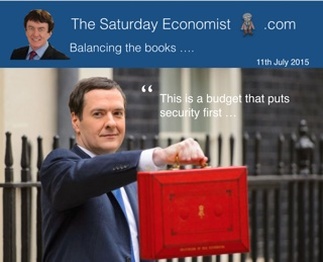 Greek Crisis The Greek Prime Minister Alexis Tsipras gained backing from Parliament for the tough austerity proposals now on offer from the Troika creditor countries. The leaders of the Eurozone and the broader EU are due to meet in Brussels on Sunday to discuss the way forward. The French more conciliatory than the Germans in a desire to resolve the impasse. That’s laissez-faire for you. The Greeks in pursuit of a haircut and something for the week-end have been disappointed this week. Uncle Sam will be listening in tomorrow, a deal looks likely. The cash will surely begin to flow next week and quite right to. Lots of time to pick up the flotsam and jetsam as a result of the IMF rule book. Can anyone understand the attraction of a 23% VAT rate? UK Budget It was the UK budget this week. The Conservative party budget delivered a few surprises, not least a big increase in the living wage. Chancellor Osborne is set to balance the books, disrupting private sector payrolls in the process. The OBR forecast is for borrowing to fall to £69.5 billion this year and £43 billion next. A return to surplus now expected by 2020. Total debt will now peak at just over £1.6 trillion. Higher personal allowances and higher rate thresholds increases would cost the Exchequer £1.3 billion. A pension relief claw back would balance the giveaway. Lower corporation tax rates and higher investment allowances would be funded by a further banking levy, dividends tax and insurance premium tax. Welfare cuts and reductions in tax credits are expected to deliver savings of over £3 billion this year and £4 billion next. Painful cuts on the front line. Tough love offset by a big increase in the minimum wage. A National Living Wage, starting at £7.20 and rising to £9 an hour by 2020, replaces the £6.50 minimum wage for those over 25. A commitment to defence spending at 2% of GDP assisted sentiment on the Tory back benches. The Chancellor will have to come to terms with the implications of the wage hike. Job losses are expected to be contained to just 60,000. The impact on inflation incalculable as yet. So what to make of it all? A big agenda, unimpeded by coalition hackles outmanoeuvring the left in the process. The government is set to balance the books by 2020. Higher growth and higher inflation could get us there sooner … In other economics news … The construction figures were released this week. Output in the construction industry showed an increase of 1.3% compared to May last year. All new work increased by 3.2% while repair and maintenance decreased by 1.7%. The May data is well below our expectations for the year. We expect construction output to increase by 4% for the year. Manufacturing output increased by just 1% in May. A big surge in oil, gas and extractives, increased production output by 2.1%. We still expect manufacturing growth of just over 2% this year. No rebalancing on the agenda with (private) service sector growth increasing at 4%. Trade in Goods … hopes for rebalancing on the trade front surged. The deficit trade in goods and services fell to £0.4 billion in May, compared with £1.8 billion in April 2015. A deficit of £8.0 billion on goods was partially offset by an estimated surplus of £7.6 billion on services. This deficit is the smallest since June 2013. The narrowing a result of imports decreasing by £1.4 billion to £43.4 billion. Exports were unchanged at £43.0 billion. Imports of goods decreased by £1.4 billion in May 2015 to £32.6 billion, the lowest level since April 2011. Most notable decreases were evident in the imports of ships and materials. Will the trend be sustained? Not really. Big boats and surges in metal stocks do not of themselves suggest a trend. Lower oil imports and prices helped. We still expect a deficit trade in goods of over £120 billion this year. China Stock Market … In other world news, time to worry about Chinese stock market bubbles and the looming debt crisis in Puerto Rico. You would think we have never seen a bubble in the Western world, such is the excitement. The best way to undermine a bear market - ban people from selling! Simps. One of the great benefits of a command economy. So when will rates rise? … In the US, Janet Yellen once again reaffirmed a commitment to raise rates this year despite the protestations of the IMF. September remains the favourite for the first rate rise with a further rate rise quite possible before the end of the year. We continue to expect a UK rate rise within three to six months of the first Fed move. Don’t rule out a UK rate rise before the end of the year. So what happened to Sterling this week? Sterling moved down against the Dollar to $1.548 from $1.557 and moved down against the Euro to €1.391 from €1.403. The Euro moved up against the Dollar to €1.113 from 1.109. Oil Price Brent Crude closed at $58.66 from $60.39. The average price in July last year was $106.77. The deflationary push continues. A $75 - $80 recovery by Q4 remains the base case in our outlook forecast. The rise in US summer stocks may threaten price levels. Markets, steadied. The Dow closed down at 17,751 from 17,730 and the FTSE closed down at 6,673 from 6,585. Gilts - yields were mixed. UK Ten year gilt yields moved to 2.04 from 2.02 US Treasury yields moved to 2.37 from 2.29. Gold moved up to $1,159 ($1,168). That’s all for this week. Don’t miss the Great Manchester Economics Conference in October. The Agenda is now on the web site. The Early Bird deal is now open. The FIRST one hundred tickets save over £50. Check out the web site Sign up and Save. The Saturday Economist - now mailing to 50,000 businesses every month! John © 2015 The Saturday Economist by John Ashcroft and Company : Economics, Corporate Strategy and Social Media ... Experience worth sharing. The material is based upon information which we consider to be reliable but we do not represent that it is accurate or complete and it should not be relied upon as such. We accept no liability for errors, or omissions of opinion or fact. In particular, no reliance should be placed on the comments on trends in financial markets. The receipt of this email should not be construed as the giving of investment advice. 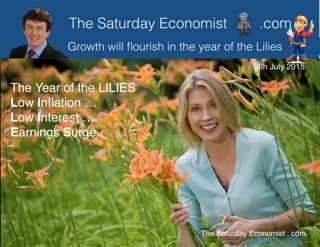 The ONS released the latest data on the UK economy this week. Growth in 2014 was revised up to 3%. Growth was also revised up to 2.9%, in the first quarter of this year, from the previous estimate of 2.4%. The collapse in construction output in the first quarter was revised to reveal growth of just over 4%. The SADD (Seasonal Adjustment Deficit Disorder) continues in the construction data set. The service sector continues to drive growth in the economy, with private service sector growth over 4%. Manufacturing output continues to languish with growth of 3% last year slowing to just 1.4% in the first three months. For the year as a whole, we expect UK GDP growth of just under 3% slowing only slightly into 2016. We have updated our UK Economic Outlook (July edition) to reflect the latest data release. The Bank of England having reduced the growth forecast from 2.9% to 2.5% in the latest inflation report, will have to revert to the February estimate as a result of the construction data revision. Will this change the outlook for interest rates amongst MPC members? - Inevitably. Household spending is driving the recovery with a 3.4% surge in spending evident in the first quarter. Investment trends continued with growth of 5% in the first quarter. We expect the economy to flourish in the second half, in this, the year of the Lilies. Low inflation, Low interest rates and an earnings surge are pushing spending and growth in the economy. The Treasury will benefit from higher tax receipts and lower unemployment in the short term. The trade deficit and current account deficit the only manifestations of malaise in a booming economy. So what of survey data? The latest survey data from the CBI was positive. Rain Newton-Smith, CBI Director of Economics, said: “Activity over the latest quarter as a whole has been good. We expect the economy to sustain a solid pace of growth over the remainder of the year as lower oil prices and inflation continue to boost real incomes and consumer spending.” Ah yes The Year of the LILIES! The Markit/CIPS UK PMI® data for June were released this week. Construction sector output growth rebounds to its fastest rate for four months in June the headline. Services growth was sustained at marked pace. Manufacturing was the odd one out. Growth slowed to a 26-month low. Don’t get too gloomy, the Index fell to 51.4 in June, down from a revised reading of 51.9 in May. The PMI remained above the neutral 50.0 mark. Still in growth territory but at a slow rate. There has been some concern about export performance in the sector despite the slow recovery now taking place in Europe. Our more detailed analysis of sixty sectors in manufacturing suggests a stronger performance for the year as a whole. But not much - just over 2% growth this year and next. Slightly below trend rate. Interesting Jaguar LandRover announced this week, outsourcing to Austria. Over the past five years, Jaguar Land Rover has doubled sales to more than 462,000 vehicles, doubled employment to more than 35,000 people and invested more than £10 billion in new product creation and capital expenditure. The company has invested heavily in its UK vehicle manufacturing facilities at Castle Bromwich, Halewood and Solihull to support the introduction of 10 all-new vehicles, including the Jaguar XE, Jaguar F-Type, Range Rover Evoque and Land Rover Discovery Sport. Nevertheless, growth and capacity absorption is pushing output into Europe ahead of new capacity coming on stream in Brazil and China. Overall - UK car registrations will be around 2.6 million this year, manufacturing output will struggle to hit the 1.6 million mark. The trade deficit in cars (and goods) will continue to haunt the rebalancing agenda. So when will rates rise? … In the US, September remains the favourite for the first rate rise with a further rate rise quite possible before the end of the year. In the UK, the latest growth revisions will ensure the hawks begin to flap their wings despite the low inflation outlook. We expect a UK rate rise within three to six months of the first Fed move. Don’t rule out a UK rate rise before the end of the year. So what happened to Sterling this week? Sterling moved down against the Dollar to $1.557 from $1.573 and moved down against the Euro to €1.403 from €1.411. The Euro moved down against the Dollar to €1.109 from 1.114. Oil Price Brent Crude closed at $60.39 from $63.23. The average price in July last year was $106.77. The deflationary push continues. A $75 - $80 recovery by Q4 remains the base case in our outlook forecast. Markets, were troubled. The Dow closed down at 17,730 from 17,952 and the FTSE closed down at 6,585 from 6,753. Gilts - yields fell. UK Ten year gilt yields moved to 2.02 from 2.19 US Treasury yields moved to 2.39 from 2.45. Gold moved up to $1,168 ($1,170). That’s all for this week. Don’t miss the Great Manchester Economics Conference in October. The Agenda is now up on the web site. The Early Bird deal is now open. The FIRST one hundred tickets save over £50. Check out the web site Sign up and Save. The Saturday Economist - now mailing to 50,000 businesses every month! John © 2015 The Saturday Economist by John Ashcroft and Company : Economics, Corporate Strategy and Social Media ... Experience worth sharing. The material is based upon information which we consider to be reliable but we do not represent that it is accurate or complete and it should not be relied upon as such. We accept no liability for errors, or omissions of opinion or fact. In particular, no reliance should be placed on the comments on trends in financial markets. The receipt of this email should not be construed as the giving of investment advice. |
The Saturday EconomistAuthorJohn Ashcroft publishes the Saturday Economist. Join the mailing list for updates on the UK and World Economy. Archives
July 2024
Categories
All
|
| The Saturday Economist |
The material is based upon information which we consider to be reliable but we do not represent that it is accurate or complete and it should not be relied upon as such. We accept no liability for errors, or omissions of opinion or fact. In particular, no reliance should be placed on the comments on trends in financial markets. The presentation should not be construed as the giving of investment advice.
|
The Saturday Economist, weekly updates on the UK economy.
Sign Up Now! Stay Up To Date! | Privacy Policy | Terms and Conditions | |
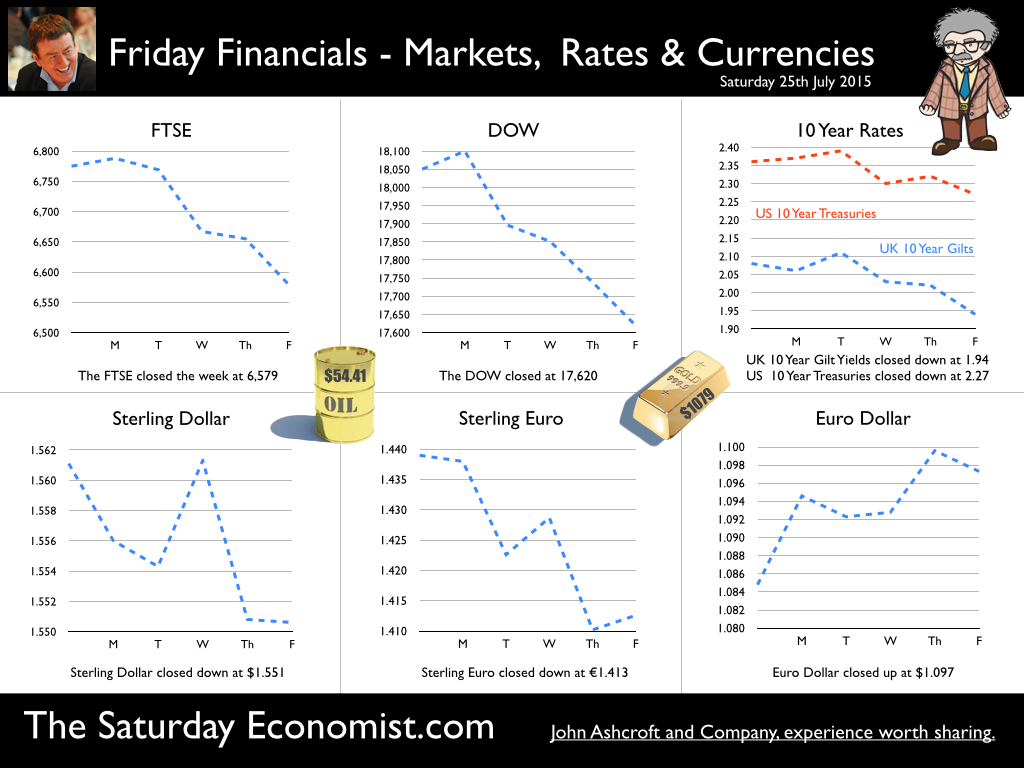
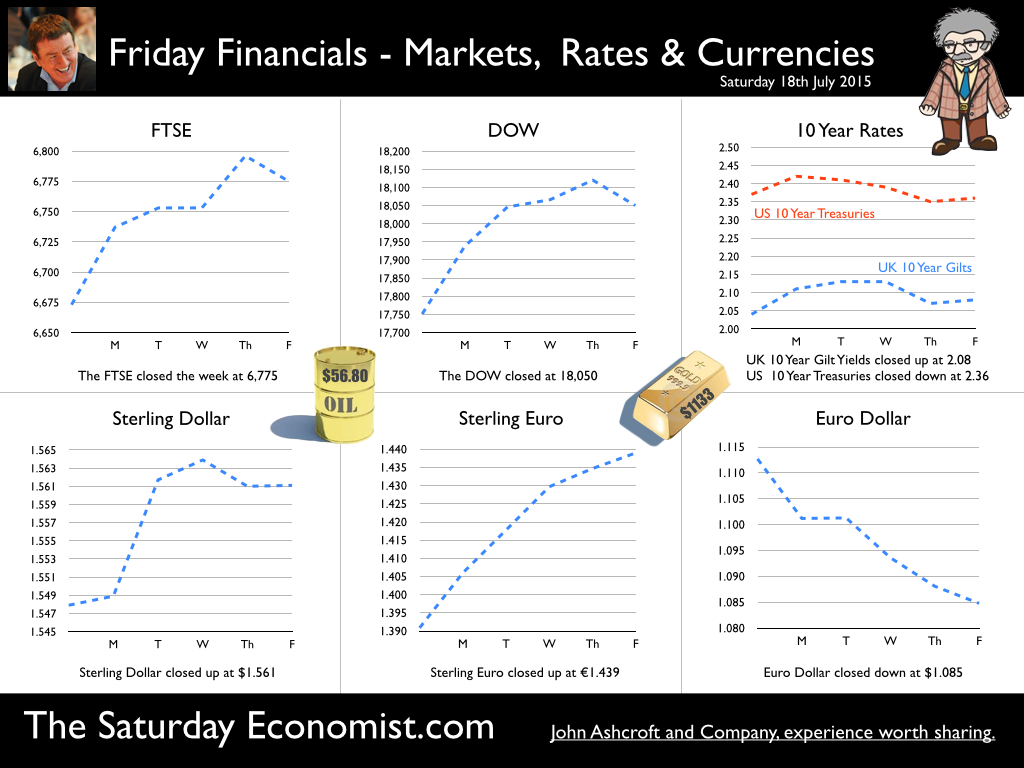
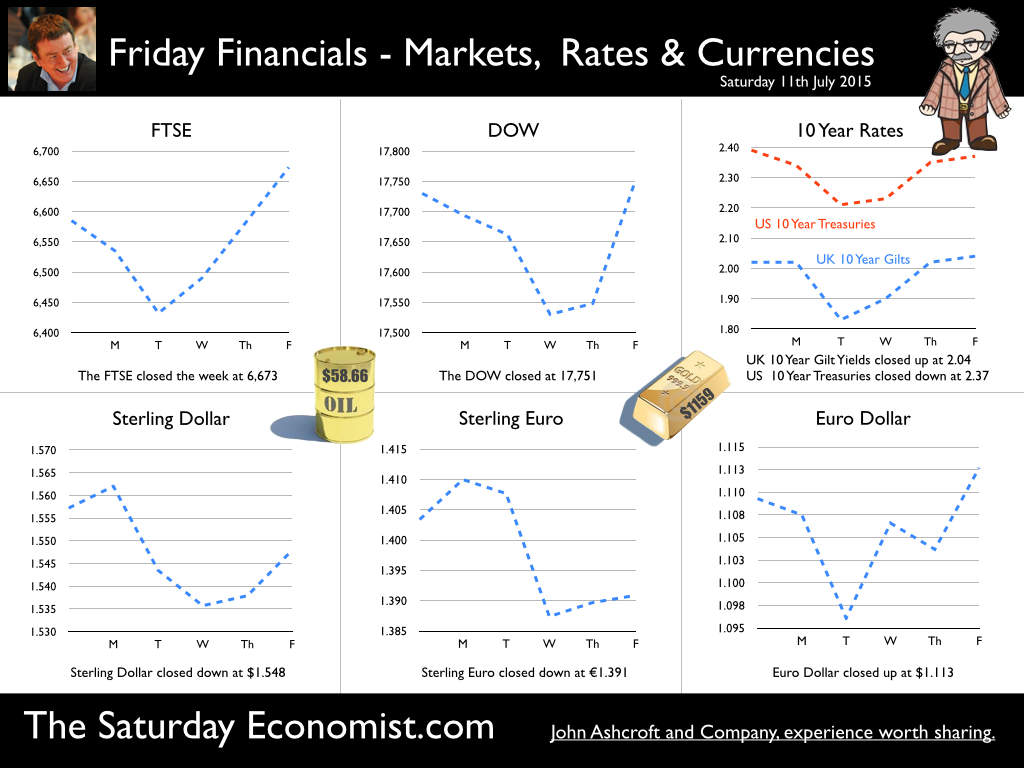
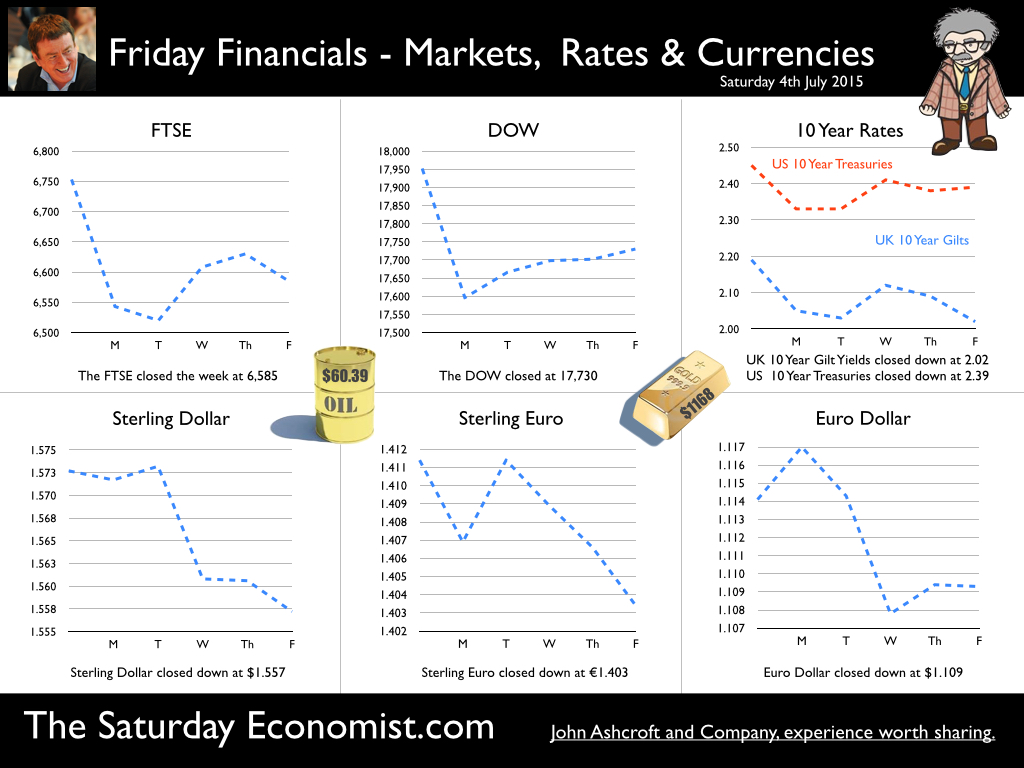
 RSS Feed
RSS Feed